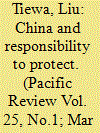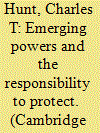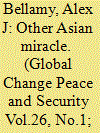| Srl | Item |
| 1 |
ID:
110194


|
|
|
|
|
| Publication |
2012.
|
| Summary/Abstract |
This article tries to analyze Chinese policy stance on the Responsibility to Protect (RtoP) concept from two levels: its basic attitude towards the core principles of this concept and its specific attitudes towards the execution of this concept, that is, the international intervention actions. Starting from the clarification of the RtoP concept, the article analyzes the maintenance and change of China's stance on state sovereign and non-interference principle. In the third part, four features of Chinese specific attitudes on intervention actions are abstracted, including cautiousness, aversion of military means, emphasis of UN authority and local support. Then the article further examines China's policy during the Libyan war, and finds that it basically follows the above framework.
|
|
|
|
|
|
|
|
|
|
|
|
|
|
|
|
| 2 |
ID:
147974


|
|
|
|
|
| Summary/Abstract |
The perceived clash of norms associated with the emergence of rising powers is nowhere more pronounced than in relation to the responsibility to protect (RtoP). However, attempts to explain rising powers’ engagement with norms such as the RtoP are often limited and limiting in what they can tell us. Orthodox models portray predominantly linear and diffusionist logics of norm evolution that underplay the complex interaction implicit in unpredictable outcomes at the systemic level. This article identifies a range of factors that drive participation (or generate hesitation) amongst emerging powers in the development and application of the RtoP. It proceeds to illustrate how changes in normative behaviour emanate from top-down and bottom-up processes as well as the feedback between them. It argues that norm evolution is consequently a unique and emergent outcome of complex international society and therefore argues for using complexity thinking as a heuristic to augment current models and explanations of the evolution of norms in the international system.
|
|
|
|
|
|
|
|
|
|
|
|
|
|
|
|
| 3 |
ID:
127858


|
|
|
|
|
| Publication |
2014.
|
| Summary/Abstract |
East Asia has a long history of genocide and mass atrocities. For much of the Cold War, East Asia was one of the world's most violent regions, experiencing multiple outbursts of mass killing. Since the end of the Cold War, however, the region has been transformed thanks to another Asian miracle. There are now fewer cases of genocide and mass atrocities in East Asia today than at any point in history for which we have reliable records. This article demonstrates and then tries to account for the dramatic decline of mass atrocities in East Asia. It argues that the decline was enabled by a combination of three major structural changes: reduction in the selection of mass atrocities as a weapon of war, increase in incomes, and progress towards democratization combined with the emergence of new ideas about sovereignty and their accommodation with existing principles of non-interference. Together, these structural and ideational changes created a changed regional context of increased costs and reduced payoffs for the commission of mass atrocities.
|
|
|
|
|
|
|
|
|
|
|
|
|
|
|
|
| 4 |
ID:
110187


|
|
|
|
|
| Publication |
2012.
|
| Summary/Abstract |
The paper reviews Thailand's position on RtoP through in-depth interviews with those currently working most closely with RtoP-related issues within the Ministry of Foreign Affairs, the National Human Rights Commission, the Armed Forces and NGOs. The interview results reveal that Thailand's position on RtoP is mixed. While the country is willing to support the international community implementing RtoP through UN humanitarian operations, it is inclined not to define any of its own internal security problems as an RtoP-type situation. The paper highlights the challenges posed by separatist insurgents in Southern Thailand, and the recent violent political confrontation during April and May 2010, two internal security cases viewed by some observers as RtoP-type situations. But from Thailand's perspectives, almost all those interviewed insist that these situations are matters of internal security affairs. In addition, the preventive dimension of RtoP has not received much attention and has rather been challenged as to how such measures for the prevention of RtoP crimes differ from those more broadly undertaken to achieve the same goals as RtoP, but are not being called as such. Therefore, given the present context, Thailand's position on RtoP will unlikely change for the better if RtoP continues to be advocated as a concept in its current state.
|
|
|
|
|
|
|
|
|
|
|
|
|
|
|
|